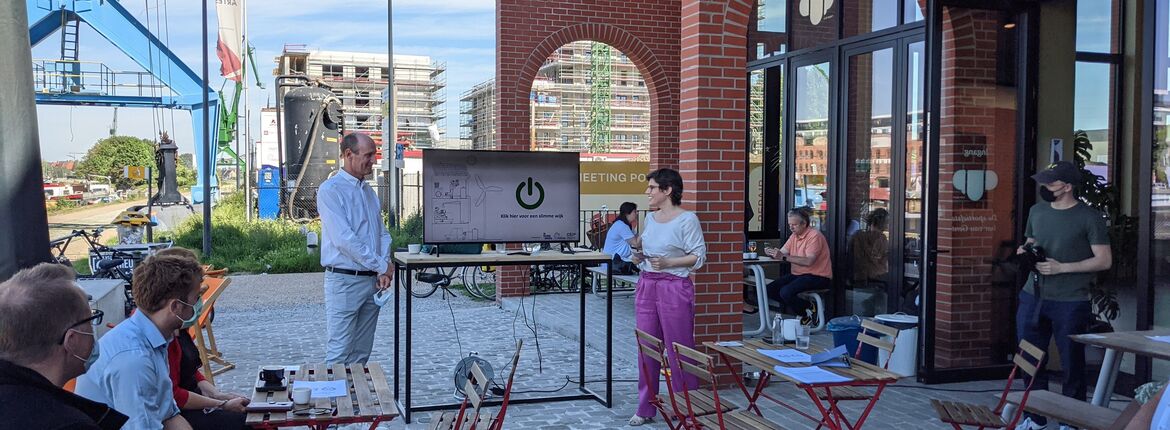Belgian minister for Energy officially opens DuCoop virtual power plant at the Nieuwe Dokken
During a press meeting on June 2, the Belgian federal minister for Energy Tinne Van Der Straeten officially opened the Nieuwe Dokken district virtual power plant. Electricity consumption and storage is now managed to match local renewable energy production. At full deployment, this newly built urban district in Ghent will attain more than 400 housing units, a city building with a school, a kindergarten, a sports facility and some commercial spaces. New technology and an advanced energy management system will help the district achieving higher energy efficiency and a higher share of renewable energy.
The virtual powerplant will consist of different elements: more than 80kWp of solar PV-panels, a district battery storage system of 240kWh, 20 22kW charging points for electric vehicles and a lot of manageable loads (a heat pump of 125kW, a water treatment plant, vacuum and sewage pumps, district heating network, etc.), all managed by the sustainability cooperative DuCoop. As the district is growing, more renewable energy installations and loads are connected to the local energy system and data network. A cloud-based supervisory management system can in turn optimize the setpoints of all these different assetts to increase the efficiency of the global system and to reduce the carbon footprint of the district. DuCoop can for example adapt the collective consumption of electricity in function of the electricity market price, which is highly dependent on fluctuations in demand and availability of (renewable) energy. This helps the company save money or avoid grid-injection of locally produced renewable energy. The virtual power plant also helps offering flexibility to the electricity grid: If there is a need for flexibility, the management platform switches off or activates loads in the local energy community. In a first instance these energy services are developed for the collective energy demand, but in the future it will also allow residential consumers to participate in the optimalization of the energy balance.
A smarter district does not only result in a more efficient use of local energy sources, end-users also get more insight in their real-time energy and water consumption and how they could save energy and money. Within the European framework of local energy communities, renewable energy fromneighbouring wind- and PV parks should be shared with residential and/or corporate consumers. Other concepts like building-integrated photovoltaics and bi-directional EV charging can lead the way to energy positive districts.
The project was developed by DuCoop, supported by Clean Energy Innovative Projects, Farys, OpenMotics, the University of Ghent, Imec and Centrica. The Nieuwe Dokken serve as a pilot site for several H2020 research projects, like Interconnect (857237), Renergetic (957845) and Bright (957816). Based on the achievements of these projects, the functionality of the energy management system will be continuously improved.
Peter de Smet, director of CEIP and DuCoop sees the integrated sustainability services of DuCoop at the Nieuwe Dokken as a blueprint for newly built urban districts. “The know-how that was established at the Nieuwe Dokken can be deployed in other urban developments to set the standard for climate neutral living”. The Belgian Federal Minister for Energy, Tinne Van der Straeten, can see the Virtual power plant as an example of how the energy switch can lead to lower costs and more comfort to residential prosumers. “This project attributes to a switch to 100% renewable energy and climate neutrality”.
Tine Heyse, alderman for climate and energy in Ghent concludes: “virtual power plants like DuCoop can boost renewable energy production in residential districts and increase energy efficiency”.
Also see report on Belgian national television: https://www.vrt.be/vrtnws/nl/2... (dutch)
This project attributes to a switch to 100% renewable energy and climate neutrality
